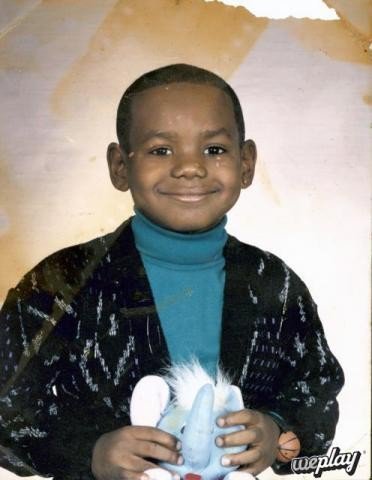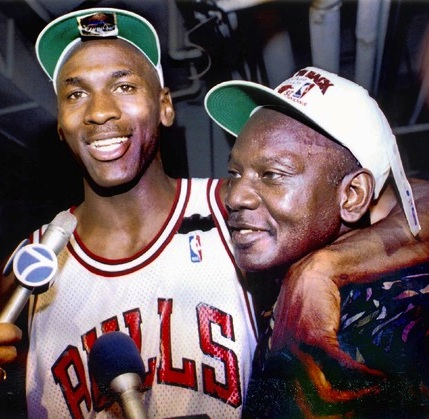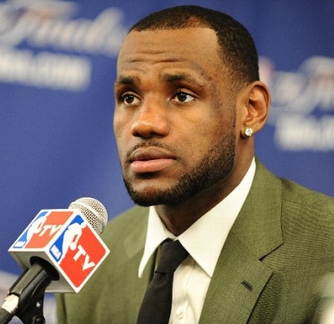 Cavs Archive
Cavs Archive  The Father Factor in the Fall of King James
The Father Factor in the Fall of King James
 In an effort to avoid adding my voice to the growing cacophony of psycho-analytical LeBronitorials coming out this week, I gave myself a tacky Father’s Day assignment, instead. “Just something simple about dads and sports,” I thought. And predictably, it wound up entirely about LeBron James. Bear with me, won’t you?
In an effort to avoid adding my voice to the growing cacophony of psycho-analytical LeBronitorials coming out this week, I gave myself a tacky Father’s Day assignment, instead. “Just something simple about dads and sports,” I thought. And predictably, it wound up entirely about LeBron James. Bear with me, won’t you?
For all the relentless comparisons of James to basketball’s pantheon of all-time greats—Kobe Bryant, Magic Johnson, Michael Jordan—one key point of distinction is rarely examined. It can’t be found in any stat sheets or game films. And it’s not quantifiable or even identifiable beyond the subtle recognition of something so deeply ingrained as to be almost primeval. It’s the “father factor”— a distinct motivational archetype generated and perpetuated (traditionally, anyway) by a masculine influence during childhood. It’s scientifically known as the “Make Daddy Proud Syndrome,” though it also goes by the more familiar and obnoxious “killer instinct” and “eye of the tiger.”
To those shouting sexism, note that the “eye of the tiger” is not passed down exclusively by dads, nor learned only by sons. It is, however, a trait more prevalent in males—tied to the prehistoric, testosterone-fueled territorialism that still pervades most Spike TV approved pastimes; be it chasing tail, drinking shitty beer, or picking fights in the parking lot outside Home Depot. Competitiveness—while initially an uncontrollable urge—is consciously nurtured from one generation to the next into a singular, steadfast, and often ill-advised drive to conquer—made all the more powerful by the child’s need to both appease and eventually surpass his good old dad. It tends to translate itself most successfully into two pursuits—politics and sports.
The Father Factor at Work
As celebrities go, it’s fairly rare that we’d have any reason to know anything about someone’s dad—unless that dad was famous first. Know much about Brad Pitt’s dad? Lady Gaga’s papa? Probably not. But when you look at some of the top tier pro athletes of our time, it’s a different story. Tiger Woods—his dad was Earl, of course. Cal Ripken and Barry Bonds were strongly tied to their less famous Major League daddies. Remember how Brett Favre honored his late father with an emotional win on Monday Night Football? And again, the Make Daddy Proud Syndrome can work for the ladies, too. If you know Venus and Serena Williams, for example, you almost certainly know Richard Williams.
Then there’s the NBA legends mentioned earlier-- the multi-time champions most often compared to LeBron James.
 Kobe Bryant: Black Mamba's dad is former 76er and European basketball star Joe “Jellybean” Bryant, who taught his only son the game virtually from birth and had him speaking fluent Spanish and Italian to boot-- prepping lil' Kobe for his days as an international superstar.
Kobe Bryant: Black Mamba's dad is former 76er and European basketball star Joe “Jellybean” Bryant, who taught his only son the game virtually from birth and had him speaking fluent Spanish and Italian to boot-- prepping lil' Kobe for his days as an international superstar.
Magic Johnson: In one of those Dove Skin Care commercials, Magic talks about working for his dad as a trash hauler when he was a kid. The job brought some predictable ridicule, but Magic saw his father’s pride and confidence and learned valuable lessons from it. “It made me stand tall, because he stood tall.”
Michael Jordan: His Airness was extremely close with his father James R. Jordan, who stood by his side when he hoisted his first NBA title in 1991. After James was murdered in 1993, MJ was affected enough to walk away from the game and pursue baseball to honor his father’s memory.
And then there’s LeBron James.
Unlike most kings, James didn’t have a father. Well, that’s not completely accurate. Someone impregnated a then 15 year-old Gloria James back in 1984. Ex-con Anthony McClelland generally gets credit for being the deadbeat, though another miscreant named Leicester Bryce Stovell tried to throw his hat in the ring (in the form of a hefty lawsuit) in 2010. Whoever the gentleman in question was, it can be agreed upon that he left his future son with favorable genes and little else.
Though tragic, this is hardly an unusual narrative. According to the U.S. Census Bureau, there are close to 14 million single parents in America raising 21 million children, and over 83% of those parents are women. Broken down further, nearly 21% of those single moms are raising their kids in poverty, often holding down two jobs or more to make ends meet. Crime, unemployment, and suicide rates among kids from single-parent homes remain well above national averages. It’s a bumpy road, and many inner city kids who put all their eggs in the basket of basketball only wind up repeating their parents’ mistakes.
This does not describe LeBron James, of course. His escape hatch from destitution was evident by the time he entered eighth grade, and his resilient (if not saintly) mother has long since left the Akron projects in the rearview mirror. She paved a way out for her son, and he returned the favor. With LeBron now among the most widely recognized and wealthiest athletes in the world, his would appear to be a clear-cut, single-parent success story. But of course, life is never quite that nice and tidy. Those early life experiences tend to imbed themselves in our character like one of those bizarro dormant viruses from a House episode.
There is no denying that James is a mamma’s boy, and there shouldn’t be any shame in that, either. Troubled though she’s been much of her life, Gloria James did do a lot to help her son succeed, and his obvious devotion to her is more than forgivable—it’s admirable.
When listening to the media’s 10,001 wild guesses as to the bizarre, seemingly unprecedented apathy of the game’s best player during the NBA Finals, however, it’s interesting that this subject is rarely if ever breeched. What did Magic, Michael, and Kobe have that LeBron didn’t—besides rings? … Well, if you start back at square one, they all had dads. And not just any dads—deeply involved ones.
Of course, it's just a theory.
 Can a boy still learn the game without a father? Of course! Can he reach the highest levels of his sport? Clearly. Countless pro athletes come from tight-knit, single-parent households with tough-as-nails moms. In LeBron’s case, he managed to excel to the level of local legend and national icon without a single driveway pickup game with Pops to fall back on. He deserves a great deal of credit for this, as well as for his commitment toward being there for his own children. But today, when we’re left to scrape around for some concept of how—two years running—a one-of-a-kind superstar can sometimes seem devoid of the killer instinct, the eye of the tiger, and various other clichés of the trade, it seems fair to start looking beyond the usual suspects for answers. Maybe it wasn't about which uniform he’s wearing, or what defense he’s facing, who his teammates are, or what off-the-court drama may or may not be on his mind. Instead, the explanation might begin in an Akron apartment complex back in the 1980s, where a boy had to take a far different road than many of the great basketball players to whom he’d later be compared.
Can a boy still learn the game without a father? Of course! Can he reach the highest levels of his sport? Clearly. Countless pro athletes come from tight-knit, single-parent households with tough-as-nails moms. In LeBron’s case, he managed to excel to the level of local legend and national icon without a single driveway pickup game with Pops to fall back on. He deserves a great deal of credit for this, as well as for his commitment toward being there for his own children. But today, when we’re left to scrape around for some concept of how—two years running—a one-of-a-kind superstar can sometimes seem devoid of the killer instinct, the eye of the tiger, and various other clichés of the trade, it seems fair to start looking beyond the usual suspects for answers. Maybe it wasn't about which uniform he’s wearing, or what defense he’s facing, who his teammates are, or what off-the-court drama may or may not be on his mind. Instead, the explanation might begin in an Akron apartment complex back in the 1980s, where a boy had to take a far different road than many of the great basketball players to whom he’d later be compared.
He wasn’t raised to root for the home team, so leaving home didn’t mean as much. He didn’t learn about business ethics from anyone outside of his high school friend circle, so giving his boss two weeks notice (or even two hours) didn't seem necessary. And, more pertinently to this piece, he didn't have the daily litmus test of the father/son dynamic to help him balance his boyhood insecurities with a suddenly budding ego on the basketball court. As a kid literally head and shoulders above his competition, who needed a killer instinct, anyway? Survival was the much more logical focus.
In the end, nothing about the way James was raised hindered him from becoming a successful athlete or a good person (televised decisions aside, he's maintained a remarkably squeaky clean life off the court his whole career). It could even be argued that the absence of the territorial, dad-induced "eye of the tiger" might actually be an evolutionary step in the right direction for malekind-- helping put one's life in a much more proper, well reasoned perspective. ...But if we're talking about the basketball court, with the game on the line...
The Action of Inaction
Have you ever worked really hard on a project, but downplayed your efforts before sharing the results with others? “Okay, here’s the shelf I built, but keep in mind, I did it in a hurry. It’s really still a work in progress. The paint isn’t right. Don’t judge me on this.” That’s fear and insecurity talking. If you had the eye of the tiger working, you’d say, “Here is my shelf. It’s done. I am happy with it.” Magic Johnson’s dad gave him the confidence and ability to shake off criticism, which he utilized to overcome his failures in the 1984 Finals and bounce back a better player. He said, “Here is my shelf.” Jordan and Bryant’s dads gave them confidence that eventually morphed into borderline megalomania. But suffice it to say, they took complete responsibility for their shelves, and all critics be damned. LeBron James is different. He's a survivalist, and his actions-- or lack thereof-- appear more calculated. By shying away from the moment, he's also mostly avoided ever missing the big shots. And as a result, he can’t really be told his talents were anything less than perfect. Instead, he can say, “I barely spent any time on that shelf. Did you even see me building it? I was somewhere else. I mean, it’s not my fault it fell apart.”
Whether out of naivety, arrogance, or a mix of both, LeBron undoubtedly brought the slings and arrows upon himself this past year. But when all the smoke has cleared on ESPN’s agreed-upon narrative of the villain turned choke artist, the real LeBron James has shown that he doesn’t even deserve such dramatic designations. Rather than Michael Jordan, he is closer to being basketball’s Michael Jackson at this point—hugely talented, desperate for acceptance, and inadvertently confusing the hell out of everyone. Be it Cleveland or Miami, he's a boy in a bubble world; surrounded by buddies but still searching for a father figure.
- NBA Announces 2013-2014 Schedule
- Browns Ink Sharknado
- Sharknado A No-Show For Rookie Camp
- Trent Richardson Out Until Training Camp
- Browns Sign Brandon Jackson
- Carrasco Suspended Eight Games
- Browns Add to Wide Receiver Depth with David Nelson
- Browns Need to Learn from Past Draft Mistakes
- Browns Release Chris Gocong and Usama Young
- Browns Missing on Grimes Disappointing, But Not The End
The TCF Forums
- Movies coming out
rebelwithoutaclue (Tuesday, January 21 2014 12:56 PM) - 2015 Recruiting
jclvd_23 (Tuesday, January 21 2014 12:38 PM) - The 2014 Offseason Thread
Larvell Blanks (Tuesday, January 21 2014 12:25 PM) - Official- Browns Coach Search/Rumors
Larvell Blanks (Tuesday, January 21 2014 11:53 AM) - Chris Grant's first 3 drafts
Kingpin74 (Tuesday, January 21 2014 10:13 AM) - Mike Brown
YahooFanChicago (Monday, January 20 2014 11:15 PM) - 2014 Hoops Hockey Hijinx
jpd1224 (Monday, January 20 2014 4:44 PM) - 2014 Recruiting
jclvd_23 (Monday, January 20 2014 2:26 PM) - Wish List - #4 Pick
Hikohadon (Monday, January 20 2014 1:26 PM) - #1 overall pick Anthony Bennett
TouchEmAllTime (Sunday, January 19 2014 1:28 PM)


